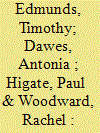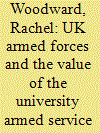|
|
|
Sort Order |
|
|
|
Items / Page
|
|
|
|
|
|
|
| Srl | Item |
| 1 |
ID:
145856


|
|
|
|
|
| Summary/Abstract |
This paper examines statistical data on the employment of women in the British armed forces. It reviews some of the issues shaping debates about women’s military employment, in order to establish the on-going significance of the topic. It looks at patterns of female military employment across the three services, and places discussion of this in the context of observations about gendered divisions of labour in the wider UK labour market. It examines data for the gendered divisions of labour within different corps, branches and occupational groups within each of the three armed services, and looks at gender patterns across ranks. It concludes by discussing the implications of these findings for both policy and conceptual work on women’s military participation.
|
|
|
|
|
|
|
|
|
|
|
|
|
|
|
|
| 2 |
ID:
053537


|
|
|
|
|
| Publication |
Malden, Blackwell Publishing, 2004.
|
| Description |
xi, 196p.
|
| Series |
RGS-IBG book series
|
| Standard Number |
1405110538
|
|
|
|
|
|
|
|
|
|
|
|
Copies: C:1/I:0,R:0,Q:0
Circulation
| Accession# | Call# | Current Location | Status | Policy | Location |
| 048552 | 355.47/WOO 048552 | Main | On Shelf | General | |
|
|
|
|
| 3 |
ID:
144727


|
|
|
|
|
| Summary/Abstract |
In recent years, there has been a sharp growth in political and sociological interest in the British military. Set against the backdrop of the armed forces’ increasing presence in everyday life, alongside the organizations’ ongoing restructuring, the current paper focuses on the MoD’s problematic attempts to recruit 30,000 reservists by 2020; what has become known as the Future Reserves 2020 programme (FR2020). We argue that these changes are driven in part by the need to cut costs in defence. However, we also suggest that they are a reflection of the changing nature of modern military organisation, and the manner in which armed forces engage with the societies of which they are a part, and with the citizens that make up that society. We locate FR2020 programme in the context of a wider narrative about the changing nature of military organisation in contemporary western democracies, identifying structural, circumstantial and normative reasons for change. We also examine the specific challenges of implementing FR2020 in practice, including issues of recruitment and retention, integration and support, and relations with families and employers, drawing on the experience of comparator countries to do so. We conclude by considering the implications of these changes, both for the future of UK armed forces, and for the evolving nature of military-society relations in Britain.
|
|
|
|
|
|
|
|
|
|
|
|
|
|
|
|
| 4 |
ID:
144183


|
|
|
|
|
| Summary/Abstract |
The value of the university armed service units to the UK armed forces is not often subject to scrutiny. Drawing on a research study of the units and their importance to a number of different constituencies, Rachel Woodward, K Neil Jenkings and Alison J Williams assess both the tangible and intangible benefits to the military’s relationship with civil society.
|
|
|
|
|
|
|
|
|
|
|
|
|
|
|
|
|
|
|
|
|